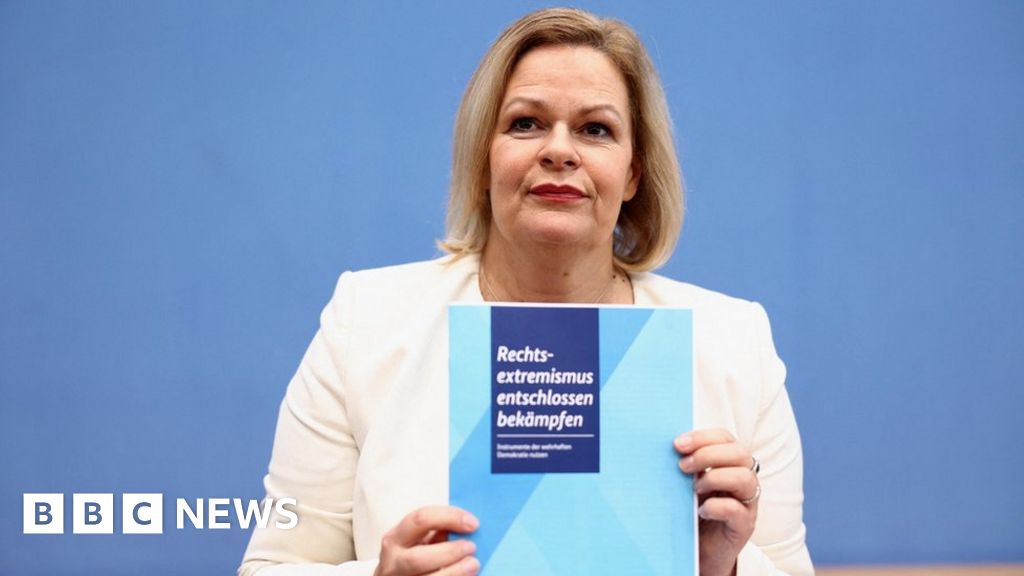- By Damien McGuinness
- BBC News, Berlin
The German government has announced a package of legal measures aimed at fighting right-wing extremism.
It comes after weeks of mass demonstrations against the far-right swept through German towns and cities.
Throughout January, hundreds of thousands of people from all walks of German life took to the streets to protest against far-right extremism.
Interior Minister Nancy Faeser said the protests had been “an encouragement and a mandate” to act politically.
Last month, Germans were shocked by revelations that senior members of Alternative for Germany (AfD) and neo-Nazi influencers attended a “secret” meeting where mass deportations were allegedly discussed.
“We want to use all instruments of rule of law to protect our democracy,” Ms Faeser said as she presented the plan to journalists on Tuesday.
“We want to break up right-wing extremist networks, cut their funding and take away their weapons.”
Ms Faeser said the 13-point plan would fight right-wing extremism, which she described as the biggest threat facing German society. Proposals include new laws that make it easier to freeze bank accounts and cut funding models for extremists. Even donors would be targeted, Ms Faeser said.
To undermine networks, officials will also be able to ban right-wing extremist events more easily and far-right activists will be stopped from entering or leaving Germany whenever possible.
Gun laws will be tightened, and it will be easier to dismiss state employees found guilty of extremism.
Many of the proposals are not actually new. In March 2022, Ms Faeser introduced an “action plan against right-wing extremism” which included some of the ideas presented today, including tougher gun laws – but these were blocked by her liberal coalition partners.
Given the current public outcry over right-wing extremism, Ms Faeser now clearly hopes that her original proposals will meet less opposition from coalition partners and in parliament. According to the interior ministry, around 20,000 far-right crimes and attacks are registered per year, and the number of such incidents is growing.
Intelligence services say that more than 38,000 people in Germany are known to be right-wing extremists, and that around 14,000 are defined as potentially violent.
Meanwhile the far-right Alternative for Germany (AfD) party continues to do well in the polls.
Since the protests began, the party appears to have slipped one or two percentage points to just under 20%.
But most supporters are clearly not put off by the demonstrations. The AfD even increased its vote share slightly in a re-run of regional elections in Berlin on Sunday. One AfD politician, who is in pre-trial detention for her alleged role in a suspected far-right coup plot in 2022, even managed to win more votes. Despite sitting in jail, Birgit Malsack-Winkemann was still on ballot papers and increased her share of the vote on Sunday – albeit not enough to get into parliament.
But the demonstrations against the far-right are continuing.
Hours after Ms Faeser’s announcement, thousands of anti-extremism protestors took to the streets in Dresden to mark the 79th anniversary of the Allied bombing of the city in 1945. The bombings destroyed one of Germany’s most beautiful cities and killed around 25,000 people.
In previous years the anniversary has been used by far-right groups to portray Germany as a victim of World War Two and to relativise the crimes of the Nazis. This year, dozens of events and demonstrations have been taking place in Dresden – most of them against the far-right.
But the real test for the German government will come in September, when Saxony, along with two other large eastern German states, will stage key regional elections. According to current polls, the AfD could win the most votes in each state, possibly even getting a third of the vote.
AfD leaders in these regions are radical and outspoken, so arguably voters know already what they are choosing and are unlikely to be swayed by protests.
Anti-racism activists welcome the German government’s tougher approach against the far-right – but fear it might be too late to contain its rise.

